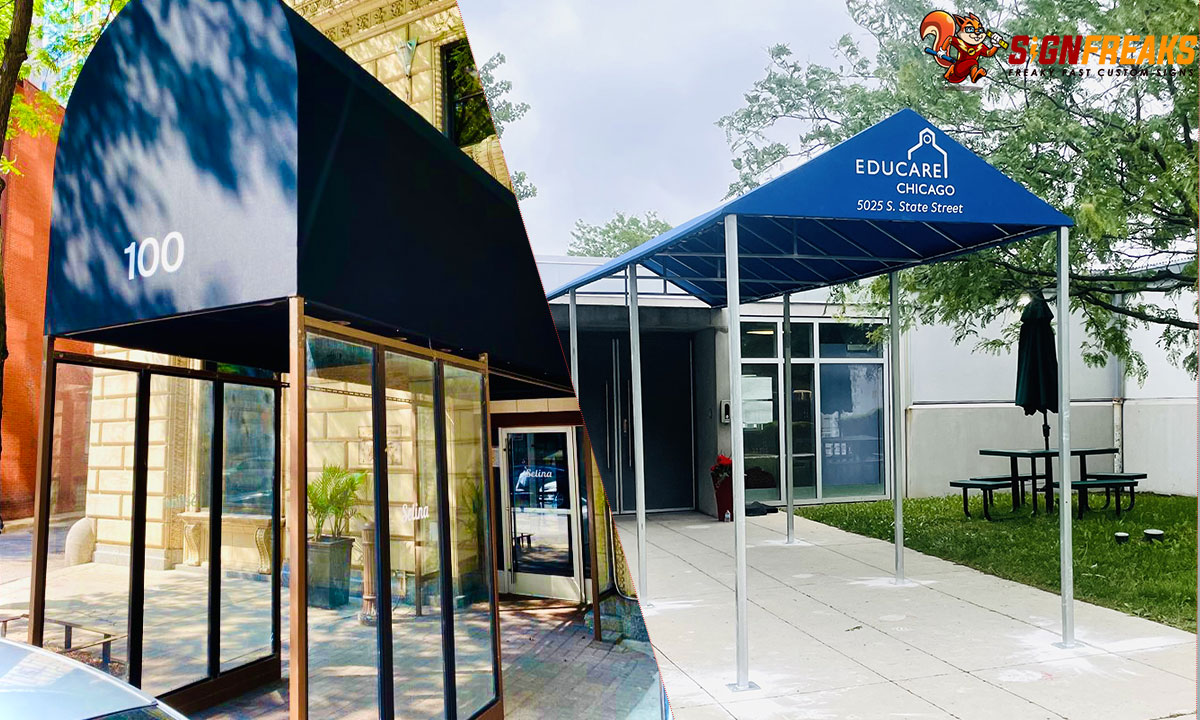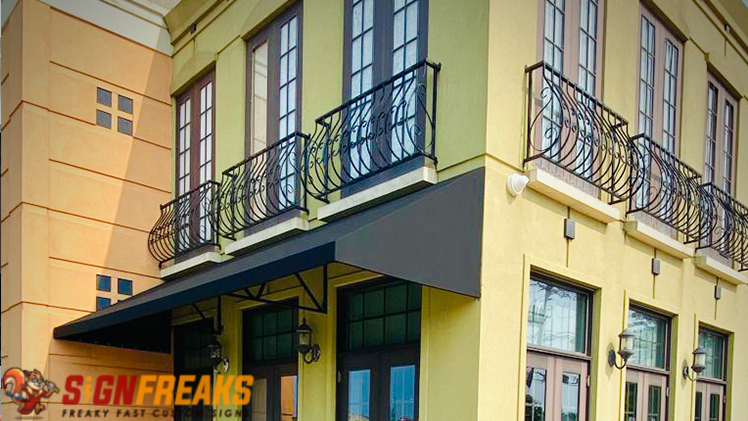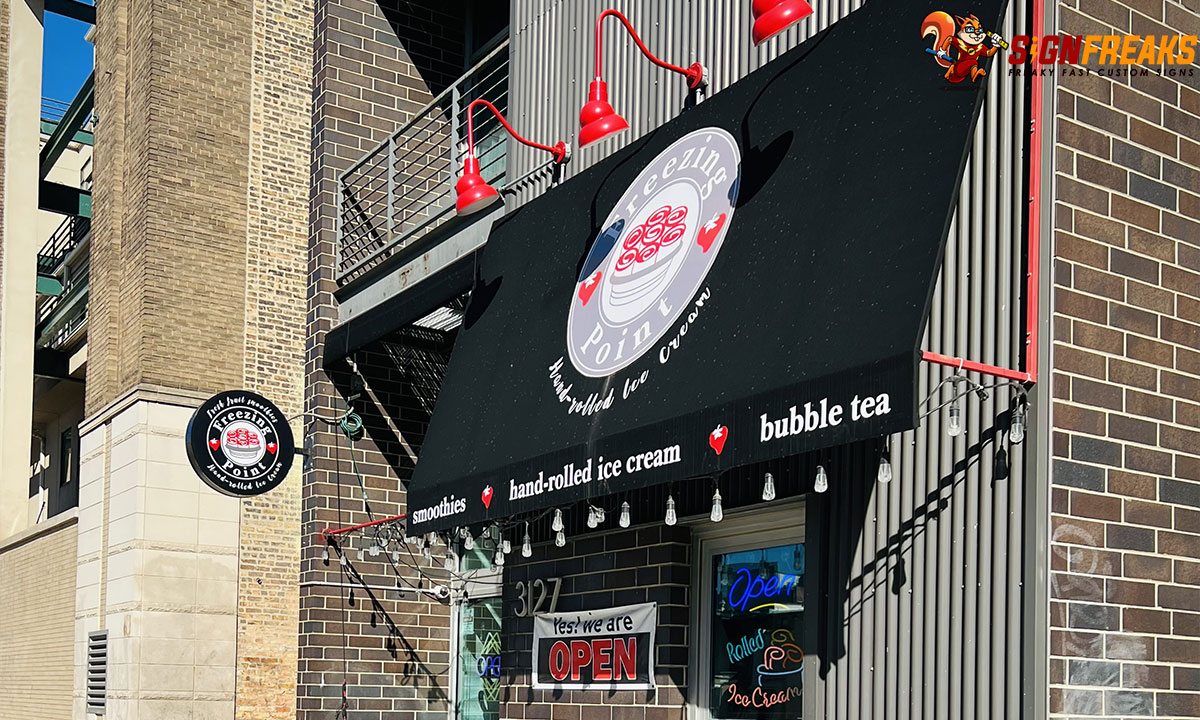Choosing an awnings Chicago is more difficult than it seems. The vast number of alternatives make the task of narrowing down to the best option more difficult. You may limit your options by starting with the awning material. Awnings have variety of materials, including canvas and vinyl. Canvas, made from cotton, is a synthetic material, but vinyl is not. Which material do you feel meets your needs the most?
Why Are Awnings Important?
Awnings Chicago are often attached to the facade of a structure. They can be used to filter ambient light or prevent direct sunlight from penetrating an interior. Putting up an awning over a patio or other outside space will keep people comfortable and increase the time they may stay there, whether it’s a business or a home. Awnings may provide shade from the sun and protection from precipitation, and they can also be used to protect your outdoor furniture.
Two Common Types of Awnings
There are two common types of awnings and they are explained below:
Canvas Awnings
- Canvas may be woven from a variety of materials, including cotton, hemp, and linen.
- The number of ounces per square yard is the standard measurement used to classify canvas.
- In general, the cost of the fabric increases with its thickness. The heavier material is more weather-proof because of its greater thickness (including snow and hail).
- Unfortunately, canvas awnings require repeated reapplications of clear varnish to prevent the formation of mould, mildew, and even decay.
- The degradation of textile awnings in direct sunshine is only icing on the cake.
Vinyl Awning
- At around 18 ounces per square yard, this acrylic can hold its own against higher canvas weights.
- This synthetic material works best in damp environments without deterioration. It can withstand heat without melting.
- The multi-layered construction of vinyl makes vinyl awnings often three times more expensive than similar awnings Chicago.
- It’s possible that certain awnings won’t be as airy as others because of this.
The Feel and The Look
Canvas awnings can easily distinguish from vinyl awnings, both in appearance and feel. Canvas has a gritty texture and a drab look because of its more resilient and natural structure. However, vinyl has a glossy appearance. Rubbery vinyl is far more comfortable to the touch than rough canvas.
The Durability of Both Awnings
When choosing a tarp, it is also important to consider how long the material will last. Nothing beats canvas awnings Chicago when it comes to withstanding the weather and daily use. On the other hand, vinyl’s unparalleled durability eclipses that of awnings. Keep in mind that vinyl tarps last for a very long time since they are so difficult to destroy.
Provides Resistance Against Environmental Elements
Awnings are susceptible to a variety of weather conditions, including high temperatures, high humidity, and high wind speeds. Given this, testing the tarp’s weather resistance is essential.
Vinyl is impervious to water, whereas treated canvas tarps could survive a drizzle. Although there are some parallels between the two ideas, they are not the same. Defining a substance as waterproof means that you cannot damage in any way by contact with water. What this means is that getting a vinyl awning wet is not a big deal. Nonetheless, if the material is water resistant, it means it may, to some extent, prevent water from penetrating. While a canvas awning would hold up during a brief downpour or splash, it would surely rot if water were to pool on top of it. As a result, a vinyl awning is the best solution if the awning will become wet.
Further Benefits:
- As a bonus, vinyl is not nearly as susceptible to mildew and mould growth as canvas is.
- High humidity and a warm, damp environment are perfect for the growth of mould and mildew.
- It is easier to prevent the growth of mould and mildew than to try to get rid of it once it has taken hold. Preventing this from happening while utilizing a canvas tarp might be difficult.
- Even if the canvas awning is perfact to prevent the growth of mildew and mould, this is still the case. If you need to work in a wet, humid, or damp environment, a vinyl awning is perfact for you.
Unlike vinyl, you may see Canvas through outside elements. So, unlike a vinyl tarp, a canvas won’t be able to absorb as much heat from the sun. However, vinyl tarps have a solution that prevents damage from ultraviolet light. Neither of these tarps will melt in the heat. However vinyl is great if you are thinking about UV radiation. A further example of vinyl’s adaptability is its ability to withstand freezing conditions.
- Vinyl awnings are mostly famous with trailer and truck coverings due to their wind resistance.
- Not only is this substance impervious to fire, but it also has flame-retardant properties.
- A wide range of environmental variables, including these two, are not a problem for vinyl awnings.
The Lifespan of Canvas and Vinyl Awnings
- Canvas is the most popular awning material and may last for up to 10 years with proper maintenance and cleaning.
- Vinyl, because it is less durable than other common building materials, has a shorter lifespan, on average lasting only 5 to 7 years.
The Impact of Awnings on The Environment
Many shoppers want to know which materials are the most eco-friendly. Canvas is far better for the environment than vinyl. The manufacturing of vinyl causes enormous air pollution, but canvas has a far smaller impact on the environment.
Some recycling facilities will accept vinyl, but many others will not due to a lack of the specialized equipment required to process it. It can be difficult to find a facility capable of processing vinyl. The majority of this material makes its way to landfills. However, most recycling centres, readily accept Canvas. cotton, to add insult to injury, is a biodegradable substance and may be disposed of in a landfill rather than a recycling. When shopping for a tarp, canvas should be your material of choice if you care about the planet.
If you, too, wish to install awnings at your windows or storefronts, let Signfreaks know. We are SignFreaks– the best awning company in Chicago.










